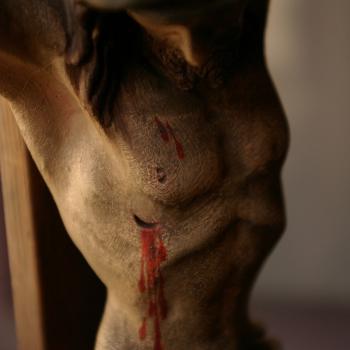Lectionary Reflections
Matthew 21:28-32
September 25, 2011
I was sitting at my desk at home one morning last month when the phone rang. It was Herbert Coleman, Director of Recruitment and Admissions at Perkins School of Theology where I teach. "Alyce, have you forgotten that you agreed to teach a class to our project transformation college interns this morning?"
Long pause on my end while I thought to myself . . . well, never mind precisely what I thought to myself. The gist of it was "Yes."
"I'll be there as soon as I can," I told Herbert. "Just one thing—can you tell me what I said I would talk about?"
I don't think I've ever gotten ready so quickly or made the 20-mile drive to Dallas from Allen as quickly. I remember knocking over one of my garbage cans in the alley behind my house as I backed out of the garage. I didn't stop to set it upright again. It horrified me that I had said I would do something and forgotten. I got there and it went fine. But how could I have forgotten? One contributing factor was that I forgot to enter it in my calendar. But I forgot to do that because I was preoccupied with other things, like packing to go out of town on a trip and meeting a writing deadline. It got me thinking that there are lots of things we say we'll do and even write down on our lists of things to do that we never do. This parable makes the point that the will of God better not be one of those things.
In the parable of the Two Sons, another parable unique to Matthew's Gospel, the father calls one son first to go work in the vineyard. He refuses, but later relents and goes to work. The second son placates the father with a quick agreement to go and work but he never actually goes.
Then Jesus asks, "Which of the two did the will of his father?" (21:31). His technique is much like the one used by the prophet Nathan when he confronts King David about his adultery with Bathsheba (2 Sam. 12:1-12). He tells a story and then asks the listeners to answer a question. In choosing our reply, as listeners, we pass a judgment on ourselves. (Reid, 156)
The answer seems straightforward on first glance. The first son did the father's will. But with a second glance, we see that both sons brought dishonor to the father, the first by his words, the second by his deeds. Neither son was in the right. One had the words, and the other had the deeds. We remember from Matthew's conclusion to the Sermon on the Mount that merely saying the right words does not ensure entry into the kingdom of heaven. Active obedience to Jesus' teachings must be present. In Matthew 23 Jesus warns the crowds to do as the Pharisees say, but not to imitate their actions (23:1-3).
Matthew clearly intends a tight linkage between this parable of the two sons in 21:28-32 and the earlier teaching about hearing and doing in 7:21ff. In 21:30 the second son responds, "Yes, sir" (kyrie, "sir," or "lord") which is the same word used in 7:21: "Not everyone who says to me, "Lord, Lord (kyrie, kyrie) . . ." The notion of Jesus' authority is also a theme that links the two passages. In 7:21ff, the teaching about the importance of following up verbal obedience with actions is embodied in the parable of the two houses (7:24-27). The conclusion of this parable says, "Now when Jesus had finished saying these things, the crowds were astounded at his teaching, for he taught them as one having authority, and not as their scribes." The parable of the Two Sons in chapter 21 is immediately preceded by Jesus' debate with religious leaders over the source of his authority for his actions and teachings. (Reid, 157-158)
To live a life of hearing and doing the will of God is to respect and adhere to Jesus' authority as teacher and Lord. To live a life in which one gives lip service but not life service to his teachings is to disrespect the authority of Jesus.
Following Jesus' question to listeners in Matthew 21: 31, Matthew has Jesus give an explanation of the parable. It is confusing because, while the parable focuses on doing as well as saying, the explanation focuses on believing John the Baptist. The religious leader's lack of belief in John is contrasted with the positive response of tax collectors and prostitutes to his preaching. The point is that the religious leaders who should most exemplify uprightness do not believe, while those who are thought to be unrighteous do believe and so enter God's kingdom.
Matthew probably meant his community to hear this parable as a summons to the Jewish leaders of their day to imitate the first son and join them in believing in Jesus. He also meant it as a nudge to those Christians who had initially said 'yes' and then wavered. (Reid, 160)




